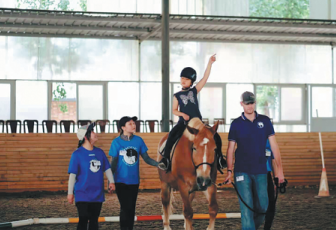'Shadow teachers' step into the spotlight
By Li Lei | CHINA DAILY | Updated: 2021-07-20 10:37

Successful trial
In response, Qi went to great lengths to convince the school authorities that the long-term benefits of using a shadow teacher would outweigh any inconvenience.
As a compromise, the school green lighted a trial for the 2018-19 academic year. The break with protocol made Guoguo the only student known to be allowed to bring a private educator onto campus in Beijing, and possibly China, at the time.
However, the head teacher of Guoguo's class resigned soon after the announcement, and Qi suspected that the shadow teacher decision was at least partly responsible for the rupture.
Despite the school's misgivings, when the 12-month trial ended, the predicted disruption and feared bullying had not materialized. That resulted in the school giving permission for all disabled students to be accompanied by a shadow teacher.
Guoguo's improvement is obvious to her parents and teachers. This year, now age 9, she scored 67 on the Wechsler Intelligence Scale for Children, an intelligence test for children ages 6 to 16, compared with 59 last year.
Qi has also witnessed a huge development in his daughter's social skills, but he conceded that Guoguo has been lucky, because the general shortage of support has forced many disabled students to quit mainstream schools.
The teachers reported that they had suffered no added burden, and said they were surprised by the progress Guoguo had made.
Moreover, the other students had shown a good sense of social responsibility. The school even included Guoguo's case in its annual report to the municipal government as part of its work highlights.
Elated, Qi contacted local lawmakers and political advisers in hopes of spawning wider changes.
"There are now fewer schools in Beijing's Chaoyang district that still ban shadow teachers from campus," he said, referring to the sprawling neighborhood in east Beijing where Guoguo's school is located.
Progress, payment
Despite the progress made, the cost of each shadow teacher, around 15,000 yuan ($2,321) a month in Beijing, must still be paid by the student's family.
To bolster the talent supply and help reduce costs, Qi and several other parents have founded a nonprofit that recruits college graduates with backgrounds in special education and trains them as shadow teachers.
"Our ultimate goal is to see them included in the government-funded pool of teachers, which would help solve the cost issue," he said.
That also appears to be the government's aim. Last year, the Ministry of Education released a policy document to further boost inclusiveness during children's nine years of compulsory education.
The document urged the establishment of special education resources classrooms in schools with five or more disabled students.
It said the classroom should be staffed by professionals offering psychological counseling, rehabilitation therapy and other services tailored for individuals, and it also encouraged local authorities to purchase services from professional groups.
In addition, it called for the establishment of county-level resource centers to offer guidance to schools that enroll disabled students.
Qi praised the move, noting that many parents who cannot afford shadow teachers have been undertaking the highly specialized tasks themselves.
However, he felt that some parents have "over-accompanied" their children on campus, which has been detrimental to their development.
Not only that, the burden of assuming the role of special educator has taken a toll on the psychological well-being of some parents.
"Dozens of parents I know are taking antidepressants," Qi said.
"While accompanying their kids on campus, they see the behavioral gap between them and other children, and that can be extremely depressing."
























